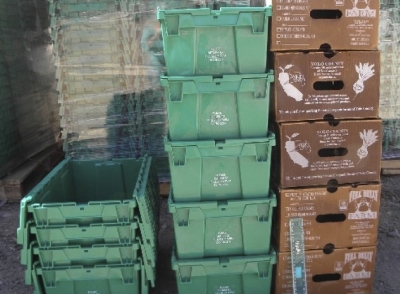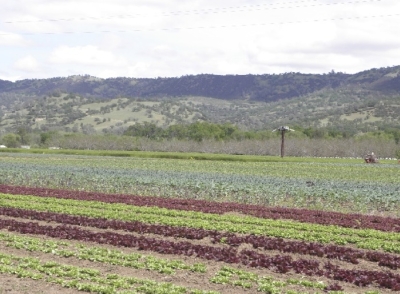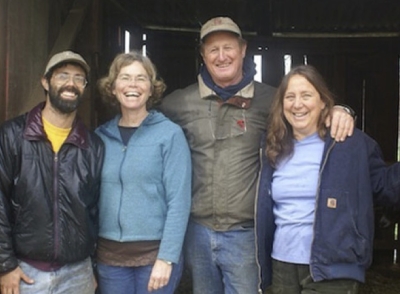Full Belly Farm
Located 100 miles northeast of San Francisco and 50 miles northwest of Sacramento, Full Belly Farm grows seasonal organic produce for distribution to restaurants, grocery stores, farmer’s markets and consumers in the Bay Area and Sacramento region.
When asked how the farm avoids using synthetic pesticides and herbicides, owner Judith Redmond responded “having rich, healthy soil is the key.” Full Belly Farm recycles agricultural waste through a compost system and then applies that compost to the fields to grow organic vegetables, fruit, nuts and flowers.
Seventy employees at the Community Supported Agriculture (CSA) farm grow, wash, pack, and distribute organic produce. After picking and washing the produce for each day, staff pack the CSA boxes. They stack the boxes onto pallets and then either store them for a few hours in a cooler, or load them directly onto a truck for delivery. CSA deliveries are usually combined with deliveries to 49 restaurants, 43 stores, or the three weekly farmers markets the farm attends. When Full Belly staff arrive at one of the 50 residential member pick-up sites, they unload the produce boxes onto hand trucks and stack them up for members to claim.
Challenges:
Delivery containers need to be able to withstand temperatures between 40 and 120 degrees, handle exposure to summer sun and winter rain, and protect produce during shipping distances up to 150 miles. Full Belly Farm used to use waxed cardboard boxes for produce distribution. Wax on the boxes increased the life of the boxes so they could be reused several times, but also rendered them non-recyclable and noncompostable.
Solution:
With a Reusable Transport Packaging grant from StopWaste, Full Belly Farm purchased 2,000 reusable rigid plastic totes with attached lids. Compared to the waxed cardboard boxes that had been reused for several trips, the reusable totes are expected to last for hundreds of trips. When they first started using the reusable totes, the farm notified CSA members about the change through their weekly newsletter. A hard copy of the newsletter in each box asked members to bring reusable bags to collect produce and leave the reusable totes at each pick-up site for retrieval the next day.
Results:
Full Belly Farm reduced the number of waxed cardboard boxes purchased by 8,330 boxes per year. At a cost of $1.70 per waxed box, farm owner Judith Redmond calculated that the farm was saving $14,161 per year in avoided purchase costs. Ms. Redmond stated that “Even if we lose some boxes during the year and have to replace them over time, it appears that we would still come out ahead financially.” In addition to the economic benefits, switching to reusable totes prevented the creation of 6.5 tons of cardboard and reduced greenhouse gas emissions by 36 tons per year, or the equivalent of taking 7.5 cars off the road/year.
Interested in reusable transport packaging? Learn more about StopWaste's Reusable Transport Packaging Equipment grants.


